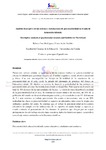Análisis descriptivo de las sesiones e instalaciones de psicomotricidad en el aula de educación infantil

Ver/
Use este enlace para citar
http://hdl.handle.net/2183/17711Coleccións
Metadatos
Mostrar o rexistro completo do ítemTítulo
Análisis descriptivo de las sesiones e instalaciones de psicomotricidad en el aula de educación infantilTítulo(s) alternativo(s)
Descriptive analysis of psychomotor sessions and facilities in Pre-SchoolData
2016Cita bibliográfica
Sportis, 2016, 2 (1): 125-146 ISSN: 2386-8333
Resumo
[Resumen] Numerosos autores señalan la importancia de un correcto trabajo de psicomotricidad en educación infantil para garantizar mejoras en el ámbito cognitivo, social, afectivo-emocional y físico. La ausencia de estudios oficiales en España que aborden íntegramente este campo de conocimiento y la falta de instalaciones adecuadas en los centros educativos, así como un nubloso reconocimiento dentro del currículum educativo. Con esta investigación, se indaga en la realidad del trabajo de psicomotricidad en el aula, desde la mirada del alumnado de prácticas del Grado en Educación infantil. El objetivo es conocer la duración y periodicidad de las sesiones de psicomotricidad, así como las instalaciones donde se desarrollan. Participaron en el estudio un total de 106 alumnos de las universidades de Galicia. La visión de éstos nos muestra carencias en el trabajo de psicomotricidad realizado por los docentes. Se constata un escaso número de sesiones, un 18% de la población del estudio no desarrollaban ninguna sesión, y sólo alrededor de un 8% disfrutaban de 3 o más sesiones de trabajo psicomotriz. En cuanto a instalaciones más de un 30% realizaban las clases de psicomotricidad en espacios no adecuados, tales como la propia aula ordinaria o pasillos del centro. Se concluye que, el trabajo de psicomotricidad en los centros educativos no es satisfactorio en cuanto tiempo y espacios, siendo contrario al pensamiento de los alumnos de prácticas que abogan por un mayor protagonismo de este trabajo en esta etapa educativa, dados los beneficios para el desarrollo y aprendizaje motor constatados en la literatura científica [Abstract] Many authors talk the importance of correct psychomotor work on children in kindergarten, to ensure improvements in cognitive, social, affective-emotional and physical level. In Spain they coexist several facts that undermine the teaching in the field of psychomotor, such as the absence of official studies fully addressing this field of knowledge, competence and lack of adequate facilities in schools educational as well as an unfortunate recognition within the education curriculum. With the completion of this research project, it explores the psychomotor reality of work in the classroom, from the perspective of student practices Pre-School Degree. The goal is to know the main features of psychomotor sessions in duration and frequency, as well as facilities where they develop. 106 students have participated from the three universities in Galicia. The sight of these shows various shortcomings in the work done by teachers motor skills. A small number of sessions devoted to motor skills, 18% of the study population did not develop any sign in its center, and only about 8% enjoyed 3 or more sessions of psychomotor work is found. As for facilities over 30% performed psychomotor classes in unsuitable, such as dining, ordinary classroom or center aisles own spaces. It is concluded that the psychomotor work developed in schools is not satisfactory as session duration and facilities, being contrary to the thinking of students in practices that advocate a greater role for this work in Pre-School schools, given the benefits for engine development and learning observed in the scientific literature
Palabras chave
Psicomotricidad
Educación física
Educación infantil
Estudiantes universitarios
Practicum
Psychomotricity
Pre-school
School
Undergraduate
Educación física
Educación infantil
Estudiantes universitarios
Practicum
Psychomotricity
Pre-school
School
Undergraduate
Versión do editor
ISSN
2386-8333





